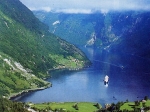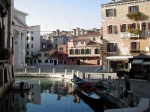The Greeks
At the end of the Bronze Age the older Greek kingdoms collapsed and a brilliant new civilization grew up in their place. The Hellenic civilization took the form of a collection of city-states (the most important being Athens and Sparta ), having vastly differing types of government and cultures, including what are more-or-less unprecedented developments in various governmental forms, philosophy , science , politics , sports , theater and music . The Hellenic city-states founded a large number of colonies on the shores of the Black Sea and the Mediterranean sea, Asia Minor , Sicily and Southern Italy in Magna Graecia , but in the 4th century BC their internal wars made them an easy prey for king Philip II of Macedonia . The campaigns of his son Alexander the Great spread Greek culture into Persia , Egypt and India , but also favoured contact with the older learnings of those countries, opening up a new period of development, known as Hellenism .
Rome
Much of Greek learning was assimilated by the nascent Roman state as it expanded outward from Italy , taking advantage of its enemies' inability to unite: the only real challenge to Roman ascent came from the Phoenician colony of Carthage , but its defeat in the end of the 3rd century BC marked the start of Roman hegemony . First governed by kings, then as a senatorial republic (see Roman republic ), Rome finally became an empire at the end of the 1st century BC , under Augustus and his authoritarian successors. The Roman Empire had its center in the Mediterranean Sea , controlling all the countries on its shores; the northern border was marked by the Rhine and Danube rivers; under emperor Trajan ( 2nd century AD ) the empire reached its maximum expansion, including Britain , Romania and parts of Mesopotamia . The empire brought peace, civilization and an efficient centralized government to the subject territories, but in the 3rd century a series of civil wars undermined its economic and social strength. In the 4th century , the emperors Diocletian and Constantine were able to slow down the process of decline by splitting the empire into a Western and an Eastern part. Whereas Diocletian severely persecuted Christianity , Constantine declared an official end to state-sponsored persecution of Christians in 313 with the Edict of Milan , thus setting the stage for the empire to later become officially Christian in about 380 (which would cause the Church to become an important institution).
Early Middle Ages
Western Europe emerged as the site of a distinct civilization after the fall of the Western Roman Empire in the 5th century , as barbarian invasions separated it from the rest of the Mediterranean , where the Eastern Roman Empire (a.k.a. Byzantine Empire ) survived for another millennium. In the 7th century the Arab expansion brought Islamic cultures to the southern Mediterranean shores (from Turkey to Sicily and Spain ), further enlarging the differences between the various Mediterranean civilizations. Huge amounts of technology and learning were lost, trade languished and people returned to local agrarian communities. In the same century, Bulgarians created the first Slavic state in Europe - Bulgaria . Feudalism replaced the centralized Roman administration. The only institution surviving the collapse of the Western Roman Empire was the Roman Catholic Church , which preserved part of the Roman cultural inheritance and remained the primary source of learning in its domain at least until the 13th century ; the bishop of Rome , known as the Pope , became the leader of the western church (in the east his supremacy was never accepted).
The Holy Roman Empire emerged around 800 , as Charlemagne , king of the Franks , subdued western Germany , large parts of Italy and chunks of surrounding countries; he received substantial help from an alliance with the Pope, who wanted to cut the remaining ties with the Byzantine Empire; in this way the domains of the Pope became an independent state in central Italy.
In the late 9th century and 10th century , northern and western Europe felt the burgeoning power and influence of the Vikings who raided, traded, conquered and settled swiftly and efficiently with their advanced sea-going vessels such as the longships .
The subsequent period, ending around 1000 , saw the further growth of feudalism , which weakened the Holy Roman Empire and the development of the Roman Catholic Church as a major power.
In the following period, Western Christianity was adopted by newly created kingdoms of Central Europe : Poland , Hungary and Bohemia .
Later Middle Ages
Early signs of the rebirth of civilization in western Europe began to appear in the 11th century as trade started again in Italy , leading to the economic and cultural growth of independent city states such as Venice and Florence ; at the same time, nation-states began to take form in places such as France , England and Portugal , although the process of their formation (usually marked by rivalry between the monarchy, the aristocratic feudal lords and the church) actually took several centuries. On the other hand, the Holy Roman Empire , essentially based in Germany and Italy , further fragmented into a myriad of feudal principalities or small city states, whose subjection to the emperor was only formal.
One of the largest catastrophes to have hit Europe was the bubonic plague , also known as the Black Death . There were numerous outbreaks, but the most severe was in the mid- 1300s and is estimated to have killed a third of Europe's population. Since many Jews worked as money-lenders ( usury was not allowed for Christians) and were generally more immune to disease (thanks to their kosher laws concerning hygiene), the Jews were often disliked by Europeans, so it was popular to blame them for the epidemic. This led to increased persecution of the Jews and pogroms in some areas. Thousands of Jews fled to Poland which, ironically, was spared by the plague.
Beginning in the 14th century , the Baltic Sea became one of the most important trade routes. The Hansa , an alliance of trading cities, facilitated the absorption of vast areas of Poland , Lithuania and other Baltic countries into the economy of Europe.
The conventional end of the Middle Ages is usually associated with the fall of the city Constantinople and of the Byzantine Empire to the Ottoman Turks in 1453 . The Turks made the city (with the new name of Istanbul ) the capital of their Ottoman Empire , which lasted until 1919 and also included Egypt , Syria and most of the Balkans .
Renaissance and Reformation
In the 15th century , at the end of the Middle Ages , powerful nation states had appeared, built by the New Monarchs who had centralized power in France , England , and Spain . Contrariwise, the Church was losing much of its power because of corruption, internal conflicts, and the spread of culture leading to the artistic , philosophical , scientific and technological improvements of the Renaissance era.
The new nation states were frequently in a state of political flux and war. In particular, after Martin Luther started the Reformation in 1517 , wars of politics and religion ravaged the continent: the schism of the dominant western church was to have major political, social and cultural implications for Europe. What became the split between Catholicism and Protestantism was particularly pronounced in England (where the king Henry VIII severed ties with Rome and proclaimed himself head of the church), and in Germany (where the Reformation united the various Protestant princes against the Catholic Habsburg emperors).
Unlike Western Europe , the countries of Central Europe , the Polish-Lithuanian Commonwealth and Hungary , resolved religious questions by adopting religious tolerance. Central Europe was already split between Eastern and Western Christianity. Now it became divided between Catholics, Protestants, Orthodox and Jews.
Colonial expansion
The numerous wars did not prevent the new states from exploring and conquering wide portions of the world, particularly in Asia ( Siberia ) and in the newly-discovered America . In the 15th century , Portugal led the way in geographical exploration, followed by Spain in early 16th century , were the first states to set up colonies in South America and trade stations on the shores of Africa and Asia, but they were soon followed by France , England and the Netherlands .
Colonial expansion proceeded in the following centuries (with some setbacks, such as the American Revolution and the wars of independence in many South American colonies). Spain had control of a great deal of South America and the Philippines ; Britain took the whole of Australia and New Zealand , most of India , and large parts of Africa and North America ; France held parts of Canada and India (nearly all of which was lost to England in 1763 ), Indochina and large parts of Africa ; the Netherlands gained the East Indies (now Indonesia ) and islands in the Caribbean ; Portugal obtained Brazil and several territories in Africa and Asia; and later, powers such as Germany , Belgium , Italy and Russia acquired further colonies.
Early Modern period: 16th , 17th and 18th century
The Reformation had profound effects on the unity of Europe. Not only were nations divided one from another by their religious orientation, but some states were torn apart internally by religious strife, avidly fostered by their external enemies. France suffered this fate in the 16th century in the series of conflicts known as the French Wars of Religion , which ended in the triumph of the Bourbon Dynasty . England avoided this fate for a while and settled down under Elizabeth to a moderate Anglicanism . Germany , divided into numerous small states under the theoretical framework of the Holy Roman Empire , was also divided along internally drawn sectarian lines, until the Thirty Years' War seemed to see religion replaced by nationalism as the motor of European conflict.
Throughout the early part of this period, capitalism was replacing feudalism as the principal form of economic organisation, at least in the western half of Europe. The expanding colonial frontiers resulted in a Commercial Revolution . The period is noted for the rise of modern science and the application of its findings to technological improvements, which culminated in the Industrial Revolution . New forms of trade and expanding horizons made new developments in international law necessary.
After the Treaty of Westphalia which ended the Thirty Years War , Absolutism became the norm of the continent, while parts of Europe experimented with constitutions foreshadowed by the English Civil War and particularly the Glorious Revolution . European military conflict did not cease, but had less disruptive effects on the lives of Europeans. In the advanced north-west, the Enlightenment gave a philosophical underpinning to the new outlook, and the continued spread of literacy , made possible by the printing press , created new secular forces in thought.
Eastern Europe was an arena of conflict for domination between Sweden , the Polish-Lithuanian Commonwealth and the Ottoman Empire . This period saw a gradual decline of these three powers which were eventually replaced by new enlightened absolutist monarchies, Russia , Prussia and Austria . By the turn of the 19th century they became new powers, having divided Poland and Lithuania between them, with Sweden and Turkey having experienced substantial territorial losses to Russia and Austria respectively. Numerous Polish Jews emigrated to Western Europe, founding Jewish communities in places where they had been expelled from during the Middle Ages.
.




